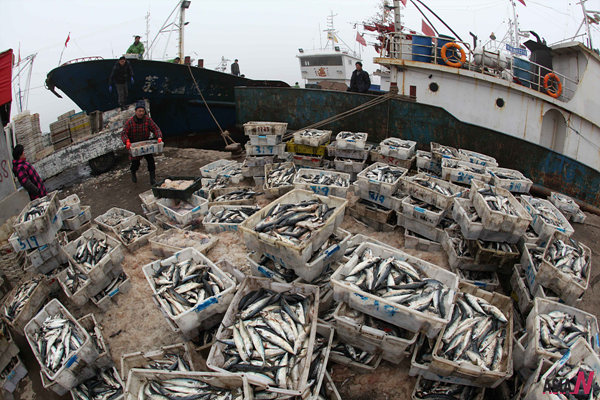Online reports prompt crackdown on gelatin-injected shrimp

Fishermen unload a fishing boat at a port of Ganyu County, east China's Jiangsu Province, Feb. 6, 2012. (Photo DB: Xinhua)
The food safety watchdog in the northern municipality of Tianjin has vowed a thorough probe into its local seafood market, after online reports that the city’s shrimp were injected with gelatin-like chemicals to increase weight.
Though the exact identity of the chemicals has yet to be confirmed, officials from the city’s Food Safety Committee admitted that some frozen shrimp in Tianjin had been adulterated with an artificial substance.
“Such shrimp have long plagued our city. In 2005, we raided a workshop and ordered 20 tonnes of shrimp to be disposed of,” said Li Zhiyong, spokesman for the committee.
In an attempt to ease public anger, the Tianjin Administration for Trade & Commerce on Wednesday initiated a 10-day campaign to seize the problematic produce in the city’s seafood markets.
Other departments would also take actions against the production and sale of such shrimp, Li said.
This latest food scandal unfolded after China.org and the website of China National Radio carried reports on the issue.
The substance, which revealed itself while some consumers washed their shrimp, was believed to be gelatin, a gelling agent that derives from animal skin and bones and can be found in foodstuffs such as jelly.
A seafood wholesaler who wished to remain anonymous told Xinhua that the gelatin was injected into the head and belly of the shrimp to make them weigh more and look plumper.
The adulteration occurred before the shrimp hit the market and was probably done by local seafood workshops, the wholesaler speculated.
On China’s Internet, the scandal has ignited heated discussions on whether the substance used is detrimental to health.
“Gelatin is safe to eat, but there is no guarantee that the injection didn’t take place in a filthy place,” said Liu Huiping, a professor at the Tianjin University of Science & Technology.
Other experts fear the issue might evolve into a new food scare, with public opinions divided on the safety of the shrimp while official information remains largely unavailable.
Cui Chunming, vice head of the Tianjin Bureau of Sanitation Supervision, said they have yet to determine the exact nature of the substance, which could range from gelatin to agar to silicone gel.
“The problem could be serious if industrial-use substances are involved,” said Cui.
























































